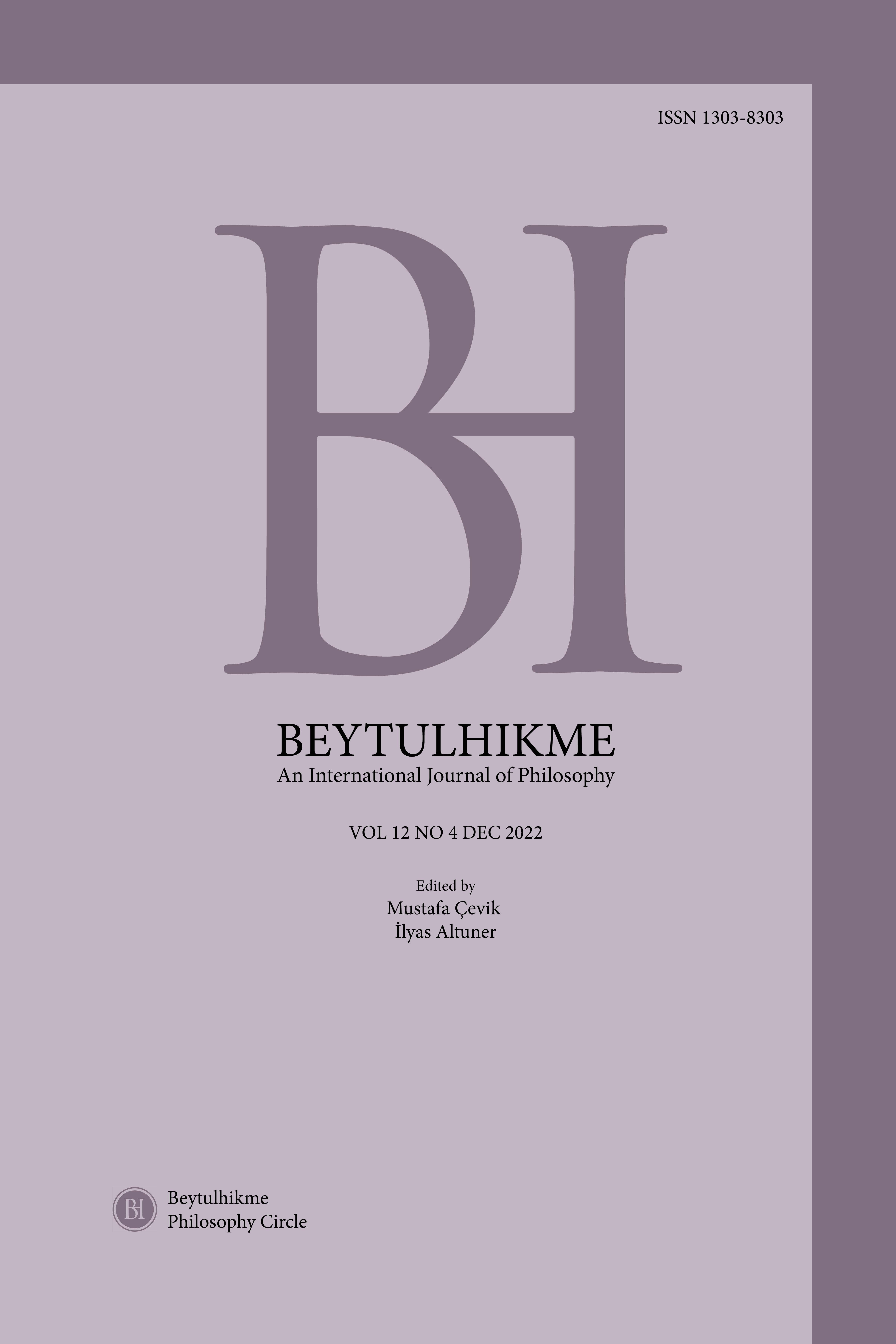Author :
Abstract
1755’te gerçekleşen Lizbon depremi çağın filozofları için fiziksel ve ahlaksal kötülük üzerine konuşmak üzere bir söylem alanı yaratmıştır. Düşüncelerini Felsefi Sözlük gibi felsefi türde ve Zadig ve Candide gibi kurgu eserlerle ortaya koyan Voltaire ayrıca bir de Lizbon Felaketi Üzerine Şiir başlığıyla şiir yazmıştır. Kısaca fiziksel kötülüğü, ahlaksal kötülükle gerekçelendirmeyi ve her şeyin tanrısal plan çerçevesinde ‘en iyi’ olduğu düşüncesini eleştirir ve bir parça umutla birlikte bunu savunan filozoflardan duygudaşlık talep eder. Rousseau ise Voltaire’in şiirini tanrısal inayete karşı yazılmış bir şiir olarak değerlendirir. Voltaire’i mevcut kötülüğü abartmakla suçlar. Ona göre fiziksel kötülüğün nedenlerini fiziksel koşullarda aramak ve tanrısal inayete inançla bağlanmak gerekir. Bu çalışma fiziksel ve ahlaki kötülük çerçevesinde Voltaire ve Rousseau’nun düşünceleri karşılaştırılmıştır.
Keywords
Abstract
The Lisbon earthquake of 1755 created a field of discourse for philosophers of the age to talk about physical and moral evil. Expressing his thoughts in philosophical genres such as the Philosophical Dictionary and fictional works such as Zadig and Candide, Voltaire also wrote a poem titled Poem on the Lisbon Disaster. In short, he criticizes the justification of physical evil with moral evil and the idea that everything is "best/well" within the framework of the divine plan, and demands sympathy from the philosophers who defend it, along with a bit of hope. Rousseau, on the other hand, considers Voltaire's poem as a poem written against Providence. He accuses Voltaire of exaggerating the existing evil. According to him, it is necessary to look for the causes of physical evil in physical conditions and to believe in Providence. In this study, Voltaire and Rousseau's thoughts were compared within the framework of physical and moral evil.
Keywords
- Adorno, T. W. (2016). Negatif Diyalektik. (Çev. Ş. Öztürk). İstanbul: Metis Yayın- ları.
- Benjamin, W. (2018). Radyo Benjamin. (Çev. C. Ener & E. O. Gezmiş). İstanbul: Metis Yayıncılık.
- Cassirer, E. (1965). The Philosophy of the Enlightenment. USA: Beacon Press.
- Cassirer, E. (2020). Rousseau, Kant, Goethe. (Çev. Mustafa Tüzel). İstanbul: Türkiye İş Bankası Kültür Yayınları.
- Dent, N. J. H. (2002). Rousseau Sözlüğü. (Çev. B. Gözkan, N. Ilgıcıoğlu, A. Çitil, A. Kovanlıkaya). İstanbul: Sarmal.
- Kant, I. (2017). Teodise Dâhilindeki Bütün Felsefi Denemelerin Başarısızlığı Üze- rine. (Çev. M. Topuz). Asos Journal (50), 543-553.
- Leibniz, G. W. (2008). Theodicee ya da Tanrının Haklı Kılınması [T]. (Çev. Levent Özşar). Bursa: Biblos Kitabevi
- Leibniz, G. W. (2019). Monadoloji – Metafizik Üzerine Konuşma [DM]. (Çev. Atakan Altınörs). İstanbul: Bilge Kültür Sanat.
- Leibniz, G. W. (2020). Monadoloji [M]. (Çev. Devrim Çetinkasap). İstanbul: Tür- kiye İş Bankası Kültür Yayınları.
- Neiman, S. (2002). Modern Düşüncede Kötülük. (Çev. A. Sargüney). İstanbul: Ayrıntı Yayınları.
- Neuhouser, F. (2008). Rousseau’s Theodicy of Self-Love. USA: Oxford University Press.
- Rousseau, J. J. (2019a). Bilimler ve Sanatlar Üstüne Söylev. (Çev. S. Eyüboğlu). İstan- bul: Türkiye İş Bankası Kültür Yayınları.
- Rousseau, J. J. (2019b). Émile. (Çev. Yaşar Avunç). İstanbul: Türkiye İş Bankası Kültür Yayınları.
- Rousseau, J. J. (2019c). İnsanlar Arasındaki Eşitsizliğin Kaynağı. (Çev. R. Nuri İleri). İstanbul: Say Yayınları.
- Rousseau, J. J. (2019d). Toplum Sözleşmesi. (Çev. V. Günyol). İstanbul: Türkiye İş Bankası Kültür Yayınları.
- Rousseau, J. J. (2020). Dağdan Yazılmış Mektuplar. (Çev. A. Akan). Ankara: Fol Ki- tap.
- Rousseau, J. J. (2021a). Julie ya da Yeni Heloise. (Çev. A. K. Paksoy). İstanbul: Doruk
- Rousseau, J. J. (2021b). Yalnız Gezerin Düşleri. (Çev. S. İ. O. Montanari). İstanbul: İthaki Yayınları.
- Rousseau, J. J. (2021c). Rousseau’nun Voltaire’e Tanrısal İnayet Üzerine Mektubu. Beytülhikme Felsefe Dergisi, 11 (1), 473-491.
- Tütüncü, F. & Tütüncü, K. (2019). Trajik Hissiyat Ütopik Siyaset. İstanbul: Metis
- Urgan, M. (2010). İngiliz Edebiyatı Tarihi. İstanbul: YKY.
- Voltaire. (1991). Hikâyeler 1 içinde Teselli Bulan İki Kişi (Çev. Fehmi Baldaş). İstan- bul: MEB Yayınları.
- Voltaire. (2014). Candide ya da İyimserlik ve Micromégas (Felsefi Öykü). (Çev. S. İpek Ortaer Montanari). İstanbul: İthaki.
- Voltaire. (2015). Zadig. (Çev. H. Fehmi Nemli). İstanbul: Alfa.
- Voltaire. (2019). Lizbon Felaketi Üzerine Şiir. (Çev. M. Topuz ve A. S. Tümkaya). Beytülhikme Felsefe Dergisi, 2019, 9 (1), 279-291.
- Voltaire, (2021a). Voltaire, Letter to Jean-Jacques Rousseau. https://www.whit- man.edu/VSA/letters/8.30.1755.html. Erişim Tarihi: 12.10.2021.
- Voltaire, (2021b). Poéme sur la loi Naturelle. http://athena.unige.ch/athena/volta- ire/voltaire-poeme-sur-la-loi-naturelle.html Erişim Tarihi: 12.10.2021.
